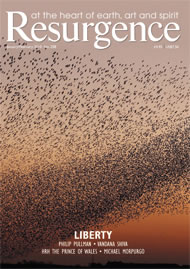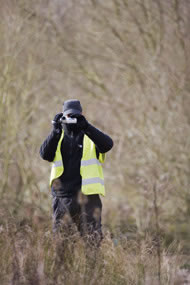Over the last six months, Plane Stupid has been targeted by a campaign of police intimidation and intrusion. Some of us have been approached to inform on the rest of the group; others have been arrested for perfectly lawful protest, including one elderly protester who was interrogated and held in a cell overnight for writing ‘you fly, we die’ in the snow. Add this to the picture of routine violence and harassment handed out to Climate Campers at the G20 and elsewhere – and the “intelligence led” pre-emptive arrest for conspiracy of 114 activists in Nottinghamshire – and it is clear that the emerging climate action movement has been singled out by the police for some very special treatment. The question is, why?
It is fair to start by looking at the reasons the police have given. In the case of the surveillance on us, it wasn’t Plane Stupid they were worried about, but “individuals within Plane Stupid”: individuals, it was claimed, who may be planning acts of violence in the name of our cause. At the Climate Camps, it was this elusive “hardcore of trouble-makers” intent on provoking violence, and in the case of the Nottingham conspiracy, “those arrested posed a serious threat to the safe running of the site.” E.ON, the owners of the protest target, give us a helpful clue about what is going here in their statement following the arrests: “While we understand that everyone has a right to protest peacefully and lawfully, this was clearly neither of those things.”
Spot the deliberate mistake. E.ON’s statement conflates the notions of ‘lawful’ and ‘peaceful’ protest; but the critical distinction between these two lies at the heart of the question of whether the extent of policing being applied to the climate movement can be justified. Peaceful does not mean the same thing as lawful. No activists at Plane Stupid or the Climate Camp have ever been convicted of a violent crime, and we are proud to be a part of the long tradition of nonviolent protest. Plane Stupid welcomes direct action in its name, so long as it is peaceful and accountable.
This is not just a technical position: we take our responsibility to human welfare very seriously indeed. Every time Plane Stupid carries out an action, we plan extremely carefully to ensure that we never cause harm to people in the process. When Dan Glass superglued himself to the Prime Minister, we’d had a lengthy discussion about the possibility that the PM might have an allergic reaction to the superglue – which is why Dan wound up sticking on to his jacket sleeve rather than his hand. Less of a story, but better, we thought, than going too close to the line marked ‘violence’.
In their intimidation of Plane Stupid, the police have adopted a range of tactics. To start with, they have approached a number of members of our organisation to ‘have a coffee’. This could appear innocent to the untrained eye, but it quickly became apparent that all was not as it seemed. Yet we were intrigued and so we went to meet them with a clean conscience and openly committed to our collective goals on tackling climate change and the social injustice it causes.
They began in a friendly and ingratiating manner, attempting to build a relationship, a “business arrangement”, to ensure they had a spy in the camp. In order to convince the committed young people involved to “see things from our perspective”, they set about the scaremongering process. They threatened us about the implications of having a criminal record for future employment. They then whispered about the “dangerous elements” within the group who were manipulating the rest to induce untold violence and mayhem. Then they assured us that other members of the group were also having coffee with them, implying that once one person cracks to their pressure we should all just loosen our morals, take the money and run. These were their last-ditch attempts to make Plane Stupid crack. However, when these tactics failed to impress and our activists didn’t ‘play ball’ they quickly lost their friendly and ingratiating veneer, and a threatening tone ensued.
All their orchestrated attempts to persuade us did not work, for one simple reason: they picked on someone who trusted her knowledge that airport expansion is incompatible with climate change, who had lost trust in a government failing to preserve her future and who was honestly and unapologetically prepared to take the necessary action with a group she trusts. Yet if they had picked someone less experienced, who had yet to develop their trust in the organisation, their tactics might well have scared them and prevented them from becoming involved with our organisation. So we sought more thorough means of recording these conversations. We bought voice recorders, set up Skype equipment, worked out how to use pinhole spy equipment and stitched a neat pocket inside a waistcoat to hold the camera. Then off we went to document the process of police infiltration into our peaceful protest group.
The world’s top climate scientists state that airports cannot expand and coal-fired power stations cannot be built if we are ever to meet the CO2 reduction targets necessary to preserve our future. Today carbon-heavy industries can pollute relentlessly with barely a legal challenge, and when ordinary citizens challenge this they are criminalised. If climate change is indeed the main concern of our government, then this logic must be challenged and the question must be asked, who are the real criminals?
Indeed, the state has made it very clear that it has no intention of addressing this conundrum: quite the opposite. The violence and intimidation, the wrongful arrests, the slurs, the infiltration and espionage being directed at climate activists are not the arbitrary spasms of a dysfunctional police force: they are brief glimpses through the cracks in the veneer of civilisation, to the darkly-moving mass that lies beneath. Our civil liberties and the future of the planet seem to be of far less value to the state than the private profits of multinational companies. As much as police tactics were unsavoury – and we are glad to have recordings to share with the general public – it must be stressed this is not about so-called bad apples in the police force: this is a strategic campaign from the Criminal Justice System to silence and criminalise peaceful protest.
We are not bank robbers, kidnappers or terrorists. We are secretaries, parents, cooks, community workers, architects and saxophonists. We are a growing movement of concerned citizens who invest in affordable gadgets to expose corruption and who are prepared to put our bodies in the way of dangerous high-carbon developments. We do so because we believe this is justified, proportionate and necessary in the face of catastrophic climate change, and that the negative consequences of our actions are far better than the consequences of continued inaction. We are motivated by human and planetary welfare, and the public good is at the forefront of everything we do.
Sometimes we have to break the law to disrupt ‘lawful activities’ that are harming the prospects of future generations. We do not hide our faces. We are ready and willing to argue our case in the courts, and to suffer the consequences of criminal convictions and sentencing. There is no need to carry out surveillance to catch us; we’re not going anywhere – you’ll find us chained by our necks to a conveyor belt, or superglued to the Prime Minister’s jacket. There is no need to punch and kick us either – that’s why we’re chanting “This is not a riot” with our hands in the air.
We are now aware of the wide range of tactics that the state might use to infiltrate, influence and deter individuals taking peaceful and accountable action against climate change. We wanted to expose the relationship between the police, the orders they are told to follow by the state and how these support continuing runaway climate change. We hoped that these investigations would serve as a warning to the many other people who want to see action taken on climate change. But there are many questions left unanswered, leaving us amazed. Whilst we put our names and faces to everything we do, in a brilliant reversal of roles we wait patiently and ask, who are these two men who want to have coffee with us, who are lurking around, untraceable, with dark glasses and brown envelopes, nowhere to be found on Strathclyde police databases?
It is time to drop the pretence of “preventing violence”, and start an honest conversation about all of this. It is time to ask what constitutes appropriate policing of peaceful protest, whether lawful or otherwise; and to question whose interests are really being served by devoting such extravagant police resources to preventing such protest whilst companies whose core activities are driving us ever closer to the precipice of catastrophic, global warming continue with their business as usual.








